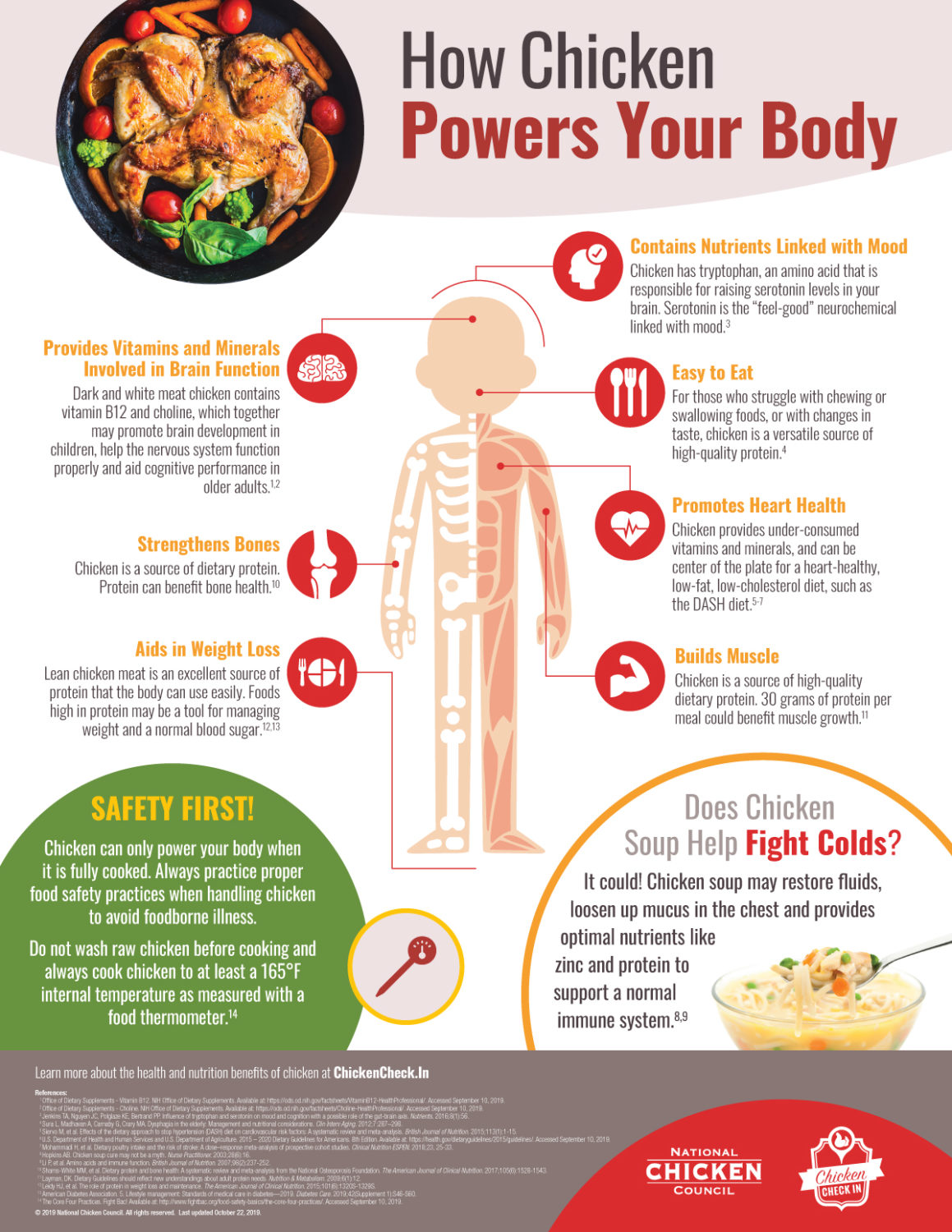Health Benefits: What are the health benefits of eating chicken?
Chicken is an excellent low-calorie and low-fat source of high-quality protein that provides important nutrients throughout our lives – from pregnancy through our later years. Here’s how chicken powers your body, from head to toe…
Chicken Contains Nutrients Linked with Mood
Chicken has tryptophan, an amino acid that is responsible for raising serotonin levels in your brain. Serotonin is the “feel-good” neurochemical linked with mood.1
Chicken Provides Vitamins and Minerals Involved in Brain Function
Dark and white meat chicken contains vitamin B12 and choline, which together may promote brain development in children, help the nervous system function properly and aid cognitive performance in older adults.2,3
Chicken is Easy to Eat
For those who struggle with chewing or swallowing foods, or with changes in taste, chicken is a versatile source of high-quality protein.⁴
Chicken Builds Muscle
Chicken is a source of high-quality dietary protein. 30 grams of protein per meal could benefit muscle growth.5
Chicken Strengthens Bones
Chicken is a source of dietary protein. Protein can benefit bone health.5,6
Chicken Promotes Heart Health
Chicken provides under-consumed vitamins and minerals, and can be center of the plate for a heart-healthy, low-fat, low-cholesterol diet, such as the DASH diet.7-9
Chicken Aids in Weight Loss
Lean chicken meat is an excellent source of protein that the body can use easily. Foods high in protein may be a tool for managing weight and a normal blood sugar.10,11
Sources:
- Jenkins TA, Nguyen JC, Polglaze KE, Bertrand PP. Influence of tryptophan and serotonin on mood and cognition with a possible role of the gut-brain axis. Nutrients. 2016;8(1):56.
- Office of Dietary Supplements – Vitamin B12. NIH Office of Dietary Supplements. Available at: https://ods.od.nih.gov/factsheets/VitaminB12-HealthProfessional/. Accessed September 10, 2019.
- Office of Dietary Supplements – Choline. NIH Office of Dietary Supplements. Available at: https://ods.od.nih.gov/factsheets/Choline-HealthProfessional/. Accessed September 10, 2019.
- Sura L, Madhavan A, Carnaby G, Crary MA. Dysphagia in the elderly: Management and nutritional considerations. Clin Interv Aging. 2012;7:287–298.
- Layman, DK. Dietary Guidelines should reflect new understandings about adult protein needs. Nutrition & Metabolism. 2009;6(1):12.
- Shams-White MM, et al. Dietary protein and bone health: A systematic review and meta-analysis from the National Osteoporosis Foundation. The American Journal of Clinical Nutrition. 2017;105(6):1528-1543.
- Siervo M, et al. Effects of the dietary approach to stop hypertension (DASH) diet on cardiovascular risk factors: A systematic review and meta-analysis. British Journal of Nutrition. 2015;113(1):1-15.
- U.S. Department of Health and Human Services and U.S. Department of Agriculture. 2015 – 2020 Dietary Guidelines for Americans. 8th Edition. Available at: https://health.gov/dietaryguidelines/2015/guidelines/. Accessed September 10, 2019.
- Mohammadi H, et al. Dietary poultry intake and the risk of stroke: A dose–response meta-analysis of prospective cohort studies. Clinical Nutrition ESPEN. 2018;23:25-33.
- Leidy HJ, et al. The role of protein in weight loss and maintenance. The American Journal of Clinical Nutrition. 2015;101(6):1320S-1329S.
- American Diabetes Association. 5. Lifestyle management: Standards of medical care in diabetes—2019. Diabetes Care. 2019;42(Supplement 1):S46-S60.

